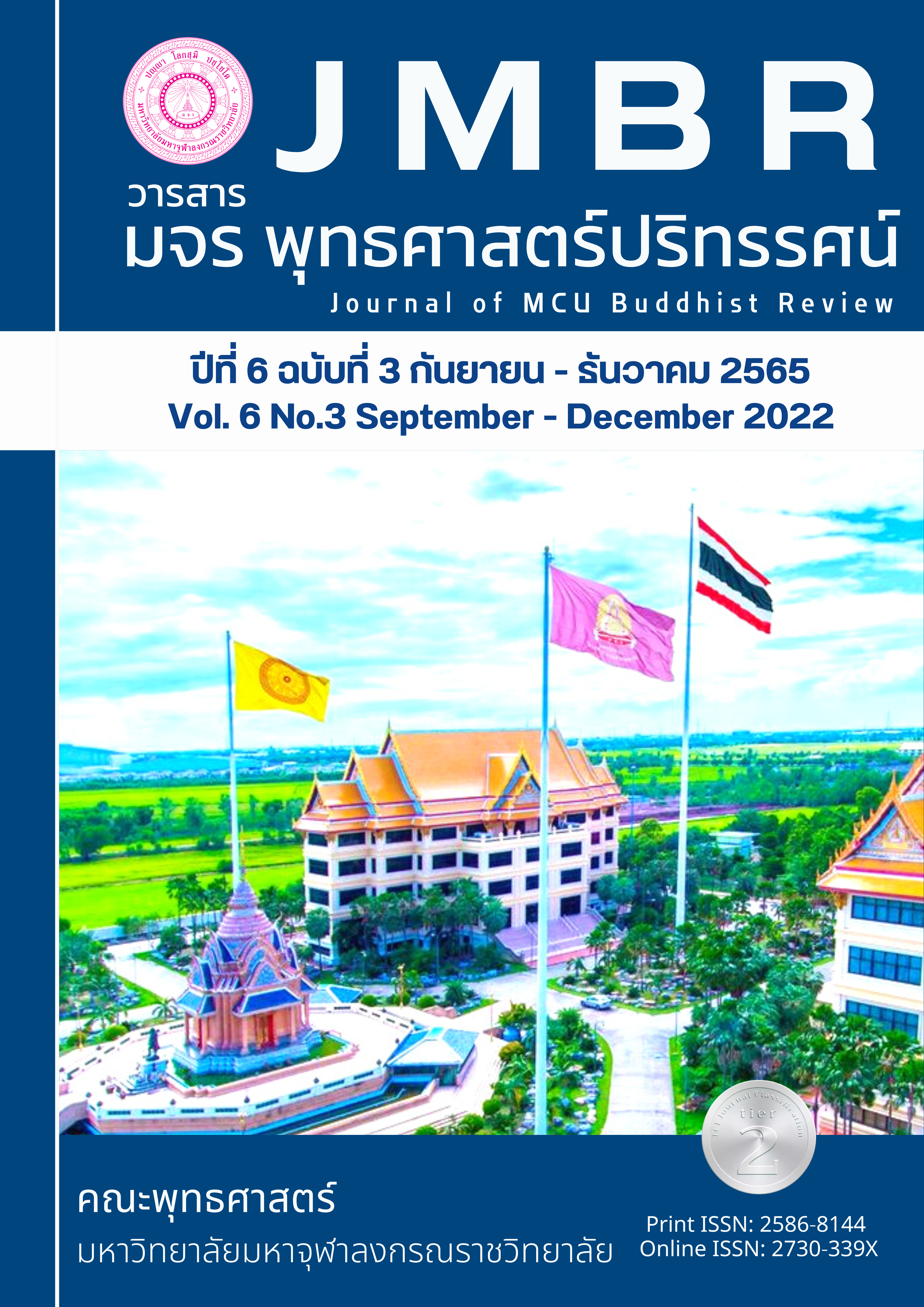ศึกษาวิเคราะห์วิธีคิดของผู้สูงอายุเพื่อการดำเนินชีวิตตามแนวพระไตรปิฎก
Main Article Content
บทคัดย่อ
บทความวิจัยนี้มีวัตถุประสงค์ 3 ประการ คือ (1) เพื่อศึกษาวิธีคิดของผู้สูงอายุตามรูปแบบโยนิโสมนสิการ (2) เพื่อศึกษาแนวคิดของผู้สูงอายุในพระไตรปิฎก (3) เพื่อวิเคราะห์วิธีคิดของผู้สูงอายุ เพื่อการดำรงชีวิตในพระไตรปิฎกตามหลักโยนิโสมนสิการ ผลการวิจัยพบว่า
1) ผู้สูงอายุ คือ ผู้ที่มีร่างกายที่แก่หง่อม คนที่มีอายุมาก กล่าวคือ เป็นผู้ที่มีอายุตั้งแต่ 60 ปีขึ้นไป พระไตรปิฎกให้ความสำคัญกับผู้สูงอายุในฐานะที่เป็นผู้มีประสบการณ์ ผู้ที่ทำคุณประโยชน์มาก่อน และ ผู้ที่มีฐานะในการครองตน
2) พระพุทธเจ้าทรงสอนวิธีคิดสำหรับผู้สูงอายุในทางพระพุทธศาสนา โดยให้พิจารณาขันธ์ 5 และไตรลักษณ์ว่า สังขารมีแต่เสื่อมไปเป็นธรรมดา ในสมัยพุทธกาลผู้สูงอายุมีแนวคิดว่าการอยู่อย่างคฤหัสถ์นั้นมีแต่ทุกข์ เพราะต้องดิ้นรนทำมาหากิน พอย่างเข้าสู่วัยสูงอายุร่างกายและจิตใจก็เริ่ม เสื่อมโทรมลงไปด้วยเช่นกัน จึงต้องการที่จะออกบรรพชาอุปสมบทเพื่อความพ้นทุกข์
3) การพิจารณาตามหลักธรรมเช่นนี้ต้องอาศัยเหตุผลอย่างแยบคายที่เรียกว่า โยนิโสมนสิการ วิธีคิดเช่นนี้สามารถนำไปเป็นแบบอย่างในการดำเนินชีวิตสำหรับผู้สูงอายุในปัจจุบันได้เป็นอย่างดีในทางด้านร่างกายและจิตใจของผู้สูงอายุ
Article Details

อนุญาตภายใต้เงื่อนไข Creative Commons Attribution-NonCommercial-NoDerivatives 4.0 International License.
- บทความที่ได้รับการตีพิมพ์เป็นลิขสิทธิ์ของวารสาร มจร พุทธศาสตร์ปริทรรศน์
- ข้อความใดๆ ที่ปรากฎในบทความที่ได้รับการตีพิมพ์ในวารสาร ถือเป็นความรับผิดชอบของผู้เขียนบทความ และข้อคิดเห็นนั้นไม่ถือว่าเป็นทัศนะและความรับผิดชอบของกองบรรณาธิการวารสาร มจร พุทธศาสตร์ปริทรรศน์
เอกสารอ้างอิง
คมสินธุ์ ต้นสีนนท์. (2561). การจัดการเรียนรู้ตามหลักโยนิโสมนสิการในรายวิชาพระพุทธศาสนาของนักเรียนชั้นมัธยมศึกษาปีที่ 2 โรงเรียนหอวัง ปทุมธานี ตำบลสวนพริกไทย อำเภอเมืองปทุมธานี จังหวัดปทุมธานี. วิทยานิพนธ์พุทธศาสตรมหาบัณฑิต สาขาวิชาการสอนสังคมศึกษา.บัณฑิตวิทยาลัย: มหาวิทยาลัยมหาจุฬาลงกรณราชวิทยาลัย.
เฉก ธนะสิริ. (2550). ทำอย่างไรจะปราศจากโรคและชะลอความชรา. กรุงเทพมหานคร: นานมีบุ๊คส์พับลิเคชั่นส์,
พระพรหมคุณาภรณ์ (ป.อ. ปยุตฺโต). (2549). วิธีคิดตามหลักพุทธธรรม. กรุงเทพมหานคร: ศยาม.
พระพรหมคุณาภรณ์ (ป.อ. ปยุตฺโต). (2550). ธรรมะสำหรับผู้สูงอายุ. กรุงเทพมหานคร: โรงพิมพ์ธรรมสภา.
พระพรหมคุณาภรณ์ (ป.อ. ปยุตฺโต). (2551). พจนานุกรมพุทธศาสน์ ฉบับประมวลศัพท์. พิมพ์ครั้งที่ 11. กรุงเทพมหานคร: บริษัท เอส. อาร์. พริ้นติ้ง แมส โปรดักส์ จำกัด.
พระพรหมคุณาภรณ์ (ป.อ. ปยุตฺโต). (2555). พุทธธรรม ฉบับปรับขยาย. พิมพ์ครั้งที่ 35. กรุงเทพมหานคร: สำนักพิมพ์ผลิธัมม์.
พระพรหมคุณาภรณ์ (ป.อ. ปยุตฺโต). (2557). พจนานุกรมพุทธศาสตร์ ฉบับประมวลธรรม. พิมพ์ครั้งที่ 27. กรุงเทพมหานคร: โรงพิมพ์มหาจุฬาลงกรณราชวิทยาลัย.
พระมหาโพธิวงศาจารย์ (ทองดี สุรเตโช). (2558). พจนานุกรมเพื่อการศึกษาพุทธศาสน์ ชุดศัพท์วิเคราะห์. พิมพ์ครั้งที่ 4. กรุงเทพมหานคร: โรงพิมพ์เลี่ยงเชียง.
นพวรรณ จงวัฒนา และคณะ. (2541). ฐานข้อมูลผู้สูงอายุที่น่าสนใจ. กรุงเทพมหานคร: จุฬาลงกรณ์มหาวิทยาลัย.
มหาจุฬาลงกรณราชวิทยาลัย. (2535). พระไตรปิฎกภาษาบาลี ฉบับมหาจุฬาเตปิฎก 2500. กรุงเทพมหานคร: โรงพิมพ์มหาจุฬาลงกรณราชวิทยาลัย.
มหาจุฬาลงกรณราชวิทยาลัย. (2539). พระไตรปิฎกภาษาไทย ฉบับมหาจุฬาลงกรณราชวิทยาลัย. กรุงเทพมหานคร: โรงพิมพ์มหาจุฬาลงกรณราชวิทยาลัย.
ราชบัณฑิตยสถาน. (2556). พจนานุกรมฉบับราชบัณฑิตยสถาน พ.ศ. 2544. กรุงเทพมหานคร: บริษัท ศิริวัฒนา อินเตอร์พริ้นท์ จำกัด (มหาชน).
วรเวศม์ สุวรรณระดา. (2559). ชาญชรา:ก้าวสู่สังคมสูงวัยด้วยความรู้และปัญญา. กรุงเทพมหานคร: ห้างหุ้นส่วนจำกัด ภาพพิมพ์.
สุชาดา พระเขียนทอง. พันตำรวจโทหญิง. (2560). การปฏิบัติธรรมโดยการพิจารณาขันธ์ 5 ของพุทธศาสนิกชนสตรีไทย. วิทยานิพนธ์พุทธศาสตดุษฎีบัณฑิต สาขาวิชาพระพุทธศาสนา. บัณฑิตวิทยาลัย: มหาวิทยาลัยมหาจุฬาลงกรณราชวิทยาลัย.


